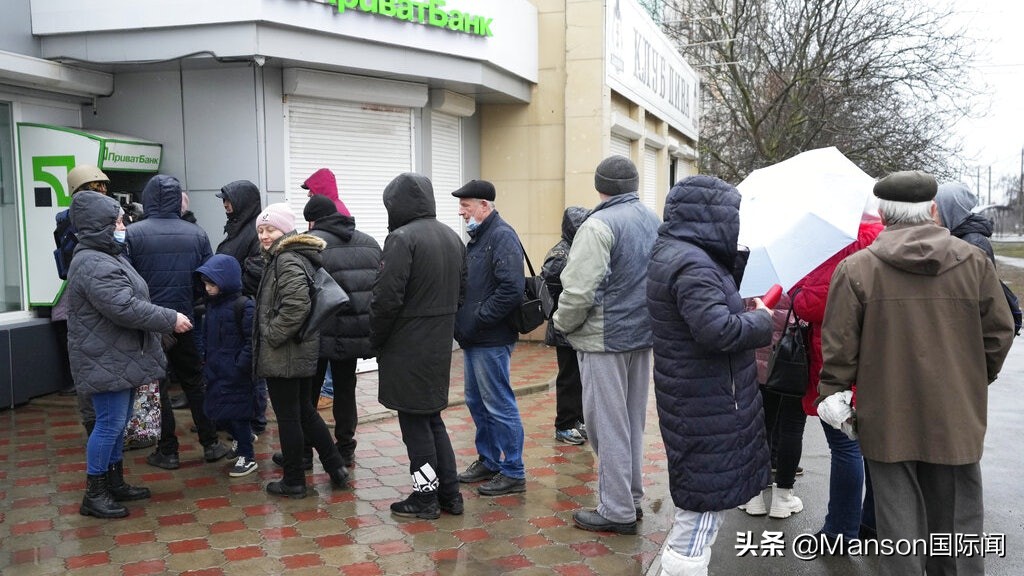When war broke out in Ukraine, the Ukrainian government imposed national martial law, and the central bank also ordered the suspension of foreign exchange market transactions and the suspension of electronic fund transfers on the 24th. The market teller machines are in a long line, and some Ukrainians have turned to buying cryptocurrency stablecoins for safe haven. At the same time, Russia is facing economic sanctions from various countries, and cryptocurrencies have also become a new way for many Russians to circumvent economic sanctions.
After the implementation of martial law, the National Bank of Ukraine introduced a series of new measures, including ordering the suspension of the foreign exchange market, restricting cash withdrawals, suspending electronic fund transfers, and prohibiting the withdrawal of foreign currency from retail bank accounts. The written order of the authorities also indicates that the distribution of electronic money, believed to refer to fiat currency held through digital accounts such as Venmo or PayPal, is temporarily prohibited.

As the authorities restricted people's withdrawal of cash, coupled with the continuous offensive of the Russian army, some Ukrainians have turned to cryptocurrencies to hedge. Among them, the market value of nearly $80 billion Usda (USDT) is currently the most popular stablecoin in the local area. Locals are buying TETAco at a premium well above $10,000. Ukrainian cryptocurrency exchange Kuna quoted on the 25th, TEDA against the Ukrainian currency hryvnia quoted at January 32.3, in Thursday (24th) the most intense panic period surged to 1 to 36.97. Tether rose more than 5% in a single day, and the price against the US dollar rose to $1.1 at one point.
In an interview with cryptocurrency news outlet Coindesk, Kuna founder Michael Chobanian said: "We do not trust the government, the banking system and the local currency, and most Ukrainians have no choice but to cryptocurrencies. As locals continue to exchange hryvnia into cryptocurrencies, the shortage of TETAcoins has become a major problem. And most people think that the main Bitcoin (BTC) and Ether (ETH) because of excessive volatility, the trend is more unstable, so they choose to turn their funds to stablecoins such as Tether to preserve value.
In fact, in the past few months, the Ukrainian government has been actively developing digital currencies, including cryptocurrencies. President Volodymyr Zelenskyy signed a bill last year that paved the way for The National Bank to issue its own digital currency, and he recently negotiated legal terms with local councils on the legalization and regulation of cryptocurrencies.
During a state visit to the United States in August, Zelenskiy also talked about the investment selling points of the country's emerging virtual asset legal innovation market. Mykhailo Fedorov, Ukraine's minister for digital transformation, said the country was renovating the payment market so that the National Bank could issue digital currency in the future.
According to the Kiev Post, Ukraine had planned to open up the use of cryptocurrencies to businesses and investors before the Russian attack. Senior state officials have also been peddling silicon investors and venture capital funds for their credibility in cryptocurrencies, though the Russian invasion has blocked efforts.
On the other hand, cryptocurrencies could also be a lifesaver for Russians. A group of Western countries, led by the United States, are planning to announce a new round of sanctions aimed at tightening sanctions on Russian banks and related individuals in response to a Russian invasion of Ukraine. However, some experts pointed out that such sanctions have become easier to circumvent in recent years, in part because of Russia's heavy adoption of cryptocurrencies.
For now, the United States and the European Union rely heavily on banks to enforce sanctions. This means that if sanctioned businesses or individuals want to conduct transactions denominated in traditional currencies such as us dollars or euros, it is the responsibility of banks to mark and block the relevant transactions. However, the EU also said that it is unlikely to exclude Russia from the SWIFT international settlement system at this stage, as it will also make it difficult for European creditors to recover their funds.
However, cryptocurrencies operate outside the global banking system, with transaction records only on top of blockchain. Ross S. Delston, an anti-money laundering compliance expert, said that if the Russians avoided using any currency other than cryptocurrencies, they could effectively avoid all sanctions.
The U.S. Treasury Department is well aware of this, with a report last October showing that officials warned that digital currencies allow criminals to hold and transfer money outside the traditional financial system, "and if left unchecked, these digital assets and payment systems could undermine the effectiveness of our sanctions."
According to research by investigative firm Chainalysis, Eastern Europe is one of the regions with the highest volume of cryptocurrency transactions involved in criminal activity. In 2020, cryptocurrency transactions reached a record -1.7 billion dollars in illegal transactions on the dark web, most of which involved Bitcoin.
However, Delston added that this method of avoiding sanctions also has its own problems, that is, cryptocurrencies are difficult to buy everything. Citing Russia's long-term dependence on imported food as an example, he pointed out: Will foreign food exporters accept cryptocurrencies with abnormally volatile prices, or the dollar as the global reserve currency?
What's more, a large part of Russia's economy comes from oil trade denominated in dollars. Delston believes that buying anything using cryptocurrencies is not a satisfactory solution for Russian oligarchs.